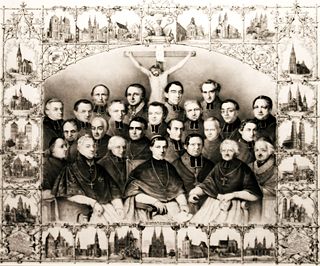Wilhelm Baum is an Austrian historian, theologian, philosopher and publisher.

The Gottfried Wilhelm Leibniz Prize, or Leibniz Prize, is awarded by the German Research Foundation to "exceptional scientists and academics for their outstanding achievements in the field of research". Since 1986, up to ten prizes have been awarded annually to individuals or research groups working at a research institution in Germany or at a German research institution abroad. It is considered the most important research award in Germany.

The Metropolitan Archdiocese of Paderborn is a Latin Church archdiocese of the Catholic Church in Germany; its seat is Paderborn. It was a diocese from its foundation in 799 until 1802, and again from 1821 until 1930. In 1930, it was promoted to an archdiocese. From 1281 until 1802, the Bishopric of Paderborn was also a state of the Holy Roman Empire.

Altstadt is the German language word for "old town", and generally refers to the historical town or city centre within the old town or city wall, in contrast to younger suburbs outside. Neustadt, the logical opposite of Altstadt, mostly stands for a part of the "Altstadt" in modern sense, sometimes only a few years younger than the oldest part, e. g. a late medieval enlargement.

The approximately 5,400 railway stations in Germany that are owned and operated by the Deutsche Bahn subsidiary DB Station&Service are divided into seven categories, denoting the service level available at the station.
The 1987–88 DFB-Pokal was the 45th season of the annual German football cup competition. It began on 28 August 1987 and ended on 28 May 1988. Eintracht Frankfurt defeated VfL Bochum 1–0 thereby winning the trophy for the fourth time.
The Rudolf-Diesel-Medaille is an award by the German Institute for Inventions in memory of Rudolf Diesel for inventions and the entrepreneurial and economical implications accounting to the laureate. Since 1953 the award has been presented yearly until 1969 and then irregularly every two or three years.
Kabarett is satirical revue, a form of cabaret which was developed in France by Rodolphe Salis in 1881 as the cabaret artistique. It was named Le Chat Noir and was centered on political events and satire. It later inspired creation of Kabarett venues in Germany from 1901, with the creation of Berlin's Überbrettl venue and in Austria with the creation of the Jung-Wiener Theater zum lieben Augustin housed in the Theater an der Wien. By the Weimar era in the mid-1920s it was characterized by political satire and gallows humor. It shared the characteristic atmosphere of intimacy with the French cabaret from which it was imported, but the gallows humor was a distinct German aspect.

Wien Meidling is one of Vienna's main railway stations located at the Philadelphiabrücke. When the Südbahnhof was demolished in December 2009 to build Vienna's new Hauptbahnhof, Wien Meidling assumed the functions of the Südbahnhof and has been in the 2020s frequented by 55,000 people daily, up from its usual 45,000, making it one of Austria's busiest railway stations.

Intercity, often shortened to IC, is the second-highest train classification in Germany, after the Intercity Express (ICE). Intercity services are locomotive-hauled express trains, usually over long-distances. There are Intercity routes throughout Germany and routes generally operate every other hour, with multiple routes giving a more frequent service on core routes. Intercity services are operated by the DB Fernverkehr division of Deutsche Bahn, Germany’s national railway.
A Zirkel is a monogram used in European student societies in countries such as Germany, Austria, Switzerland, Belgium, Hungary, Latvia, Estonia.

The Würzburg Bishops' Conference of 1848 was a four-week workshop of the German Catholic bishops in Würzburg. It can be regarded as the birth of the German and Austrian bishops' conferences.
Franz Lehrndorfer was a German organist, composer, and pedagogue.
German U15 e.V. is an association of fifteen major research-intensive and leading medical universities in Germany with a full disciplinary spectrum, excluding any defining engineering sciences.

Udo Marcus Bentz is a German prelate of the Catholic Church who has been named the metropolitan archbishop of Paderborn. He was an auxiliary bishop in Mainz from 2015 to 2023.
Klaus Pietschmann is a German musicologist. Since 2009 he has been teaching at the University of Mainz.







